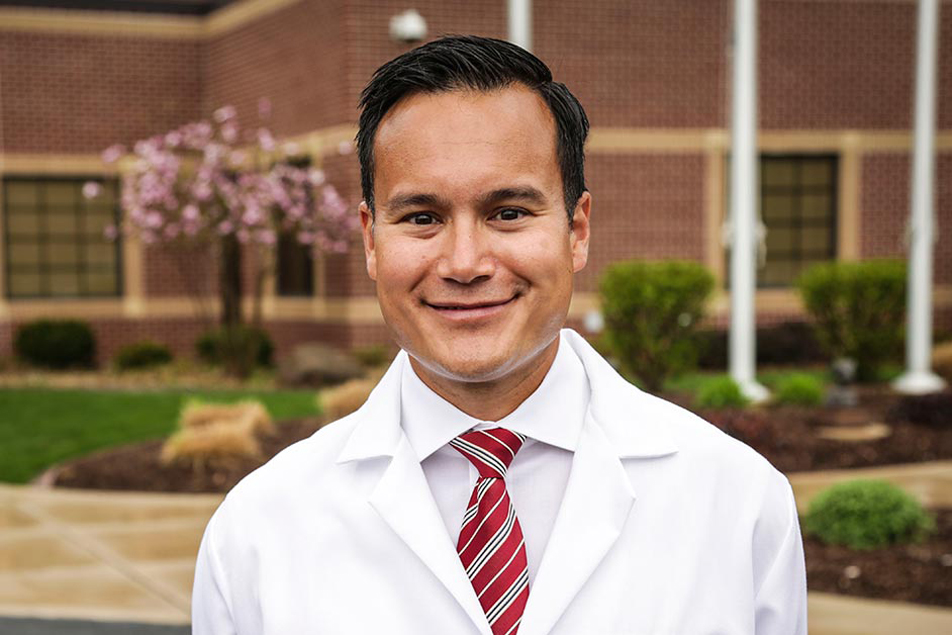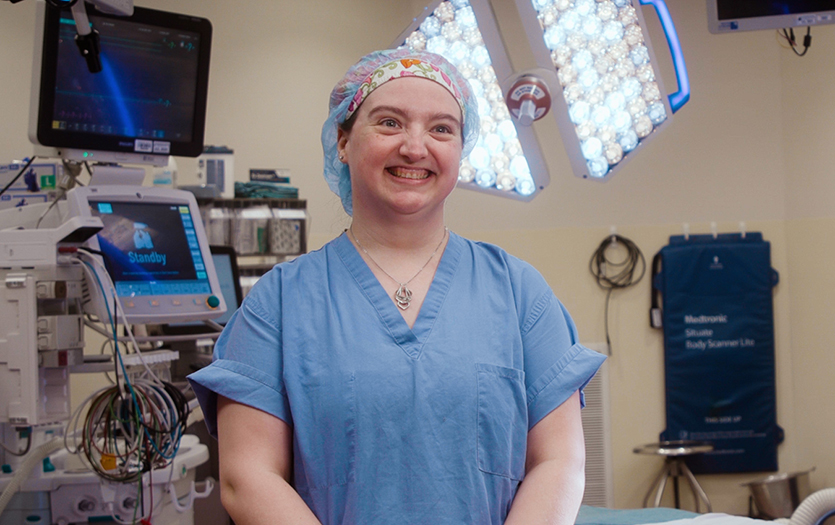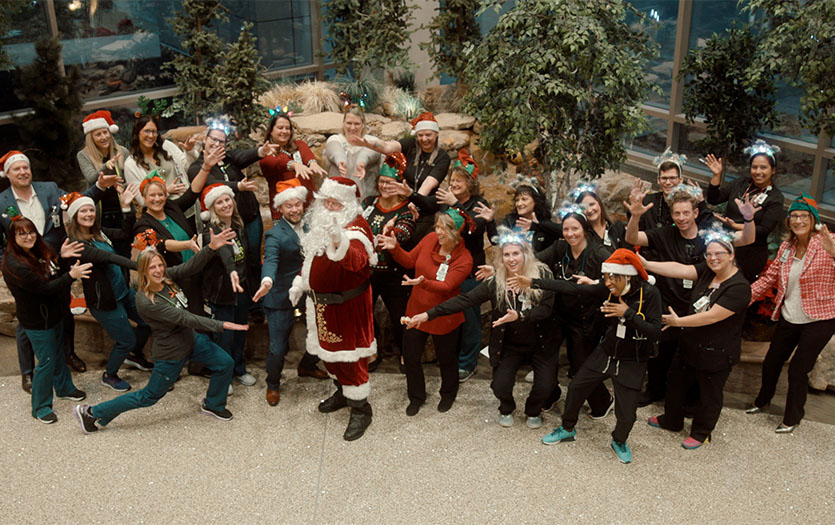
When a surgeon is precise and an expert at their craft, they earn respect among their colleagues, but when they’re known for an unwavering dedication to their patients as well, they become the epitome of balanced, complete care. Not only does Dr. Sean Garrean meet all of these specifications, he’s also a Chairman on the Cancer Committee, helping to innovate the healthcare system’s fresh approach to exceptional cancer care.
With a strong commitment to the advancement of treatment, both from a mental and physical perspective, Dr. Garrean is one of the thoughtful, thorough, exquisitely zealous People of Parkview.
Name: Sean Garrean, MD, FACS, FASCRS
Title: Colorectal Surgeon, PPG – Colon and Rectal Surgery
Education/Career Journey:
- Northwestern University McCormick School of Engineering (1996-1999) B.S.
- Northwestern University Feinberg School of Medicine (1999-2003) M.D.
- University of Illinois at Chicago, Post-Doctoral Research Fellowship (2005-2007)
- University of Illinois at Chicago (2003-2010) General Surgery Residency
- Northshore-Long Island Jewish Medical Center (2010-2011) Colon and Rectal Surgery Fellowship
What made you choose to be a surgeon?
As a colorectal surgeon (proctologist), I am constantly asked the question, “Why would anyone choose this profession?” I have a number of humorous responses that are often met with laughter from my patients, colleagues, friends, and family. But in all seriousness, I consider it a great responsibility and pleasure to practice this specialty. I am faced with many complex diseases of the bowel that require intimate knowledge of the body’s anatomy and precise execution of the fine motor skill tasks of operating. The ability to profoundly impact peoples’ lives using all of my faculties - both mental and physical - is what drew me to this wonderful field.
You see patients at most of the Parkview hospital locations. What are some unique benefits to serving different communities at different facilities?
I may be biased, but as a Parkview employee, I feel that there is no greater place to receive medical care than our not-for-profit health system. One of the unique benefits that Parkview provides for patients and physicians is the outreach program. This program encourages specialty physicians to travel to the many hospitals within Parkview’s system to provide convenient access to specialty care for all our patients in Northeast Indiana.
Currently, I see patients at Parkview facilities in Fort Wayne, Angola and LaGrange. Spending time in the patient’s community provides unique insight into their lives and enhances my ability to care for them. My nursing team and I find it quite refreshing to travel to the different locations and bring our specialty care to the patients in their own backyards, and the patients are very appreciative of this. In a sense, the whole experience seems to evoke images of the “good old days” of medicine when physicians and their staff made house calls.
How do you maintain focus and energy throughout a long shift?
I would say it is a combination of factors. First and foremost is the great responsibility we have toward our patients and their loved ones who entrust their lives to us. That in and of itself is enough motivation for me to stay focused and give it my all every day. With great responsibility comes great reward and that is the deep fulfillment that comes from healing people through surgery, which also enables me to maintain focus and energy.
And lastly, I believe it’s important to practice what I preach. As I get older, I tend to view my surgical career and life as a marathon. It is important to pace yourself, have a healthy lifestyle, and get plenty of rest when away from work. This keeps me fresh and ready to give my best for my patients.
What qualities make an exceptional surgeon?
Compassion, humility, sound clinical judgement, technical expertise, and meticulous attention to detail.
How do you handle the emotional aspect of communicating health information to patients?
Managing the emotional highs and lows of patients and their families can at times be as challenging as surgery itself. I believe a certain degree of emotional intelligence is required to understand what the patient and their family are feeling and to know the best approach to meet their emotional needs.
When a patient is nervous or unsure about the future, I do my best to comfort them. For some patients, it is a word of encouragement; for others, it is a touch on the shoulder; for others, it is humor to distract them from their predicament; and for others, it may even be a short prayer.
I think on the most basic level, people undergoing suffering want those who care for them to not just intellectually understand what they are going through, but to walk with them as a partner in their journey; to share their experience with them as much as possible.
In the end, it is a team effort. We have a wonderful supportive and caring team of nurses, social workers, care navigators, and spiritual counselors at Parkview that also come alongside patients to walk with them through their healthcare journey.
What’s your favorite procedure to perform?
I deal with a variety of disease processes, from life-threatening cancers and inflammatory diseases of the bowel like Crohn’s and colitis, to painful and debilitating conditions of the anus like hemorrhoids. One of the most amazing aspects of my job is the variety of surgical techniques at my disposal to help patients overcome their medical conditions.
On any given day, I perform a variety of procedures, from colonoscopy to anal surgery to minimally invasive laparoscopic and robotic bowel surgery. It’s difficult for me to pinpoint one in particular that provides me with a greater sense of satisfaction than the others. But if I had to choose, I would say I most enjoy surgery for colorectal cancer and inflammatory bowel disease. These diseases are so serious and have such a profound impact on a patient’s life. The ability to intervene and to potentially cure patients of these conditions is especially rewarding to me.
You’re heavily involved with the new Parkview Cancer Institute. What can you tell us about the unique facility and care model?
Again, I may be biased, but I can think of no better place to receive cancer care than at Parkview. Cancer care at Parkview is focused on optimizing the patient’s experience throughout their cancer care journey, from diagnosis to treatment to survivorship. Physicians and health care members partner with patients to walk beside them through this journey. The new Parkview Cancer Institute is a beautiful, state-of-the-art facility that brings all of our vast resources under one roof to provide convenient care for patients in one location.
What is the most important thing we can do to prevent cancer?
A healthy lifestyle (smoking cessation, alcohol in moderation only, wise eating habits) as well as regular visits with a family physician or internist would be the two most important things people can do in general to prevent cancer, in my opinion. With regards to colorectal cancer (my area of expertise), the most important thing one can do is get a colonoscopy.
Screening colonoscopy is a safe and comfortable procedure performed under conscious sedation. It enables detection and removal of polyps (precancerous growths that are the precursors to colorectal cancer). Since its inception, colonoscopy has been shown to dramatically reduce the incidence of colorectal cancer in the American population.
What’s something you hope to accomplish in your career?
In this stage of my career, my greatest focus is to provide exceptional care to my patients and to help Parkview grow into a nationally recognized center of excellence in colorectal and cancer care.
What fact would people be most surprised to know about you?
I am much older than I appear. My real age surprises most people.
What are your hobbies or things you like to do outside of work?
Most of my life outside of work revolves around my family. I enjoy playing sports (tennis, baseball, hockey) with my kids, and preparing (and eating) international cuisine with my wife. My family and I also like to travel and visit National Parks.
If you could tell people to read one book in their lifetime, which would it be?
While much of my time is spent reading medical journal articles and textbooks, I do find time for pleasure reading. I particularly enjoy reading nonfiction books about science, history, religion and travel. I would recommend reading whatever book peaks your curiosity and provides you with the most enjoyment and enlightenment.
What would we find on your bucket list?
I admire the natural beauty of America’s National Park System. I have visited close to 30 National Parks and would like to see all the parks in America’s National Park system, and as many as possible with my children before they grow up. My boys and I also enjoy watching ice hockey. I would like to watch every NHL team live with my children before they grow up.



